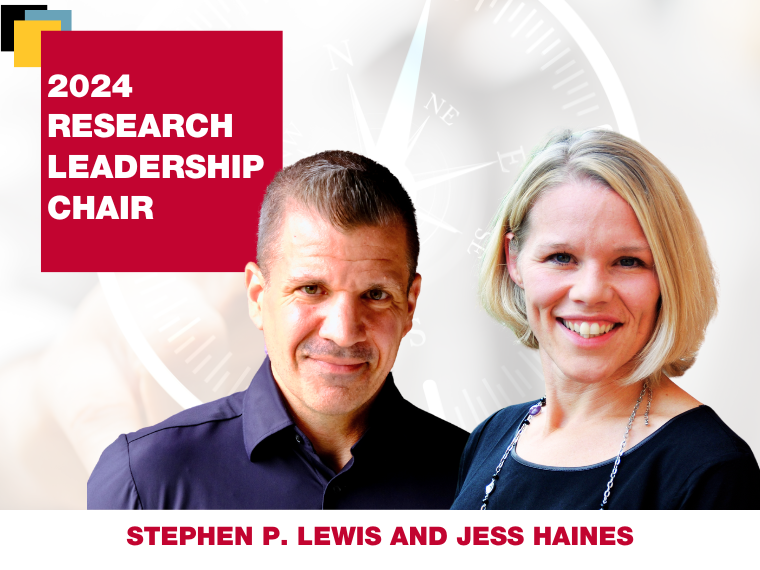
In an era where well-being increasingly drives societal progress, groundbreaking research illuminates the profound impact of research itself on enhancing collective health and happiness. Recent studies underscore research's pivotal role in fostering well-being, from bolstering mental resilience to shaping public policies, across communities and individuals.
The Research Leadership Chair recognizes faculty members who have made significant global contributions to research. Holders of these chairs within CSAHS cultivate a community of practice through research collaborations, mentorship, and community engagement.
Meet Our 2024 Recipients
Stephen P. Lewis, PhD

"In our current global context, there is a need to change the landscape in psychology and academia more broadly by challenging existing unhelpful discourses regarding mental health disability."
Stephen P. Lewis is known globally as a leading researcher in self-injury and related mental health difficulties, focusing on personal recovery, online communication, improving how educational settings support students who self-injure, and advocacy. His work prioritizes amplifying the voices of people with lived experience, aiming to foster resilience and wellbeing, combat stigma, and promote a more compassionate understanding of self-injury. Engaged in diverse advocacy efforts, including a TEDx Talk [1], media interviews, podcasts, training workshops for schools and mental health professionals, launching a non-profit, and taking on various international leadership roles, Lewis's impact extends globally.
About 1 in 5 people worldwide report having self-injured, most often to obtain temporary relief from painful emotions. Engagement in self-injury is associated with a range of mental health difficulties (e.g., depression, trauma, eating disorders) and although not suicidal by definition self-injury is the most reliable predictor of suicidal thoughts and behaviors. Unfortunately, self-injury remains highly stigmatized and often misunderstood, especially in terms of gender, with men's experiences often overlooked. Lewis draws from his own struggles, to challenge these and other unhelpful misconceptions and narratives. In doing so, he aims to promote hope and resilience among people with lived experience, while advocating for their representation and inclusion in mental health discourses and the discipline of psychology.
Lewis's research has led to significant publications and a commitment to mentorship, fostering an inclusive environment for students.
Going beyond traditional metrics, Lewis's research emphasizes qualitative impacts, such as policy change and directly reaching people through various outreach endeavors. His work has gained widespread attention, being implemented in schools to enhance student wellbeing, and even influencing social media platforms' policies on self-injury content. He is co-founder of a global outreach initiative, Self-injury Outreach & Support (SiOS) [2], which offers resources to people who self-injure and those who can play key support roles. To date, SiOS has been reached in over 180 countries. Lewis’s work champions person-centered and strengths-based approaches to understand self-injury and foster recovery. As someone with lived experience, Lewis has been consulted about the inclusion of self-injury as a diagnostic category and been invited to join panels and committees concerning mental health advocacy, policy, and service provision. He has written numerous papers and a recent book [3] offering applied strategies for various stakeholders who support people who self-injure. His personal journey, shared through talks and publications, has inspired hope and prompted action to challenge stereotypes and promote resilience, greater understanding, and inclusivity.
Jess Haines, PhD, RD

"By engaging with families and communities to develop and implement our research, we aim to create interventions and tools that people find useful and easy to implement in their everyday lives."
Jess Haines is recognized internationally as a pre-eminent researcher dedicated to advancing knowledge and interventions in the realm of nutrition and environmentally sustainable eating habits. Utilizing an interdisciplinary approach, she delves into understanding the determinants of eating behavior and translates that knowledge into innovative and scalable interventions to promote healthy and sustainable dietary choices. Through collaborative efforts with key partners, including families, practitioners and policy makers, Haines bridges the gap between research and practice, striving to effect real, lasting changes that promote health and well-being.
The impact of Haines’s research extends beyond traditional academic metrics, she has also played pivotal roles in shaping public health policies including Canada’s 2019 Dietary Guidelines. Through initiatives like the Guelph Family Health Study and innovative knowledge mobilization tools like podcasts [4] and cookbooks [5], she has translated research findings into actionable strategies for families and communities. By fostering inclusivity and equity in research practices and mentorship, Haines strives to empower diverse voices and cultivate a healthier, more sustainable future for all.
The recognition awarded to Stephen P. Lewis and Jess Haines underscores the critical role of research in effecting positive change. Their contributions highlight the power of diligent investigation in addressing societal issues, from mental health to nutrition. Their work serves as a compelling reminder that research isn't solely about acquiring knowledge—it's about leveraging that knowledge to improve lives. By championing research endeavors, we invest not only in our shared well-being but also in a future that promises greater health and prosperity for all.